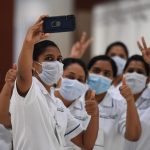Staff were putting the finishing touches to the field hospital on Wednesday. At full capacity, hundreds of doctors and nurses would work at the site in central Dubai. It is understood there would be a staggered roll out of available beds from Thursday, rising to precisely 3,030 if needed.
It may well turn out that the field hospitals are not needed, in which case we can all breathe a sigh of relief
Dr Nicholas Wyon, Burjeel Medical City
The centre is one of two field hospitals to boost the city’s bed capacity for coronavirus patients from the current 4,000 to 5,000 beds.
Speaking last week, Humaid Al Qatami, director general of Dubai Health Authority, said the emirate had plans in place for “all scenarios” and the authorities were “prepared to help 5,000, 10,000 or, God forbid, more than that”.
The World Trade Centre set-up is similar to London’s ExCel centre, which was transformed into a 4,000-bed hospital named NHS Nightingale. The facility, which is owned by Abu Dhabi’s Adnec centre, was fitted-out in the space of two weeks, with help from the British military.
In the Emirates, medical staff from government and private hospitals are on the front lines of tackling the outbreak.
There were 4,933 cases of Covid-19 as of Wednesday, with 300 to 400 new patients confirmed each day this week.
Officials believe the country will turn a corner in the next three to four weeks as the nationwide stay-home order limits the number of new cases, and mass testing identifies who has the virus.
Dr Nicholas Wyon, a critical care specialist at Burjeel Medical City in Abu Dhabi, said he expected more field hospitals to spring up across the country.
“How valuable these kind of field hospitals will become will depend on the kind of surge in new cases that we experience,” he told The National.
“If we do go through a spike in cases, which is highly likely given what has happened in other countries that are ahead of us in the pandemic, then they are going to be absolutely vital if we are to deliver high quality healthcare.
“In my experience in having worked in similar situations, field hospitals can be different to working in a normal healthcare facility.
“Some of the infrastructure that you are used to having immediately available can be a little more challenging. Things such as radiology or laboratory work may take a little longer.
“That doesn’t mean the quality of care being delivered will be any worse, it just means that some things may be a little slower.
“But it is possible to adjust the clinical decision making to suit accordingly.”
As shown with Nightingale hospital in London, which has remained largely empty as the UK outbreak was gradually brought under control, Dr Wyon said it was better to have facilities and not need them, than be ill-prepared.
“I don’t know how big a surge in cases we should expect, but it seems only sensible to plan for a similar surge that is already being seen in most other western countries,” he said.
“My experience of working for six years here in the UAE is that government agencies are very good at planning ahead and scaling up to the amount of resources that are needed.
“It may well turn out that the field hospitals are not needed, in which case we can all breathe a sigh of relief.
“It would be much worse to have not erected them and then be in a mass casualty situation.”
Dr Sandeep Pargi, a pulmonologist at Aster Hospital in Mankhool, which is close to the locked down Al Ras and Naif area, said field hospitals could be needed sooner rather than later.
“So many patients are being admitted at the moment all of the ICU wards are full… a lot of the private hospitals are full, and this is becoming a problem for patients with regular health issues,” he said.
“This field hospital is a very good decision. It will allow us to treat more patients and save more lives and help us to stop the spread of Covid-19.
“With all the testing that is now happening, we are getting 400-500 new cases every day and the curve is only going up.





